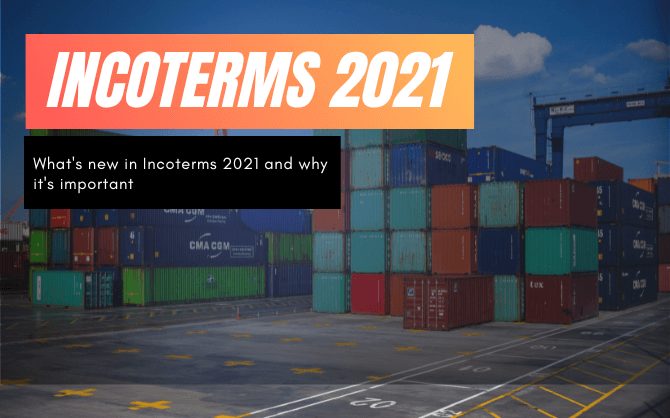
The international trade industry sees millions of transactions every year. If you are a part of it, you already know that there is no way to avoid Incoterms. International Commercial Terms were first defined in 1936 by the International Chamber of Commerce as a universal language that trading companies worldwide should use. The importance of Incoterms lies in simplicity and shared use between all countries. These 3-letter shortcodes became a known trading language regulated by international commercial law. Let’s learn more about them and why they are so important for trading companies.
Why are Incoterms important?
Simply speaking, international trading companies operate under different sets of rules depending on their country. If everyone did business only by their own rules, the communication between the buyers and sellers would be challenging. However, thanks to the international import and export regulations, we were able to standardize the language required for the business process.
How are Incoterms updated?
Ever since the Incoterms were defined, they have gone through numerous changes over the years. Usually, Incoterms go through a revision every ten years, and the last one happened in 2020. Let’s see what the current Incoterms are and if there were any changes in 2021.
The list of current incoterms
EXW – Also known as Ex Works, this abbreviation refers to a named place of delivery. EXW refers to a location chosen by the seller, where the buyer can take over the goods. That means the buyer is fully responsible for taking the goods to their place; there is no home delivery.
FCA – Free Carrier is another form of a named place of delivery. However, in this case, the seller is responsible for bringing the goods to a carrier nominated by the buyer. If the seller gives the goods to the carrier on their premises, the seller is responsible for packing and handling the goods. However, if they deliver goods to any other destination where the carrier needs to take over, then the responsibility for packing and shipping moves to the carrier.
CPT – If the seller pays for delivery of goods to a specified destination, that is called Carriage Paid To. The goods are considered delivered as soon as they change hands, and the main carrier takes them over.
CIP – Carriage and Insurance Paid To is very similar to the above term. The only difference is that there is a requirement for the seller to obtain insurance for all goods in transit. The insurance should be 110% of the contract value.
DPU – Another requirement for a seller is to Deliver the goods at Place Unloaded. The seller also covers all the transport costs like carriage, unloading, and export fees. While the terminal can be an airport, port, or inland freight interchange, the only requirement is that the facility can receive the goods.
DAP – When we talk about Delivered at Place, once the seller delivers the shipment at the named place of destination, all the risk passes from seller to buyer. Once the goods arrive at the destination country, the buyer is responsible for taking care of the import permit, customs duties and taxes, and all other documentation.
DDP – In this case, while the seller is responsible for bringing the goods to the place of destination and paying import duties and taxes, the Delivered Duty Paid clause does not include the unloading process. The buyer has minimum obligations here, and the seller is also responsible for clearing the goods and obtaining all the documentation.
Sea and inland waterway transport rules
There is a separate list of terms when it comes to the sea and inland waterway transport rules. One important thing to understand is that these incoterms rules do not apply if the goods are loaded in a shipping container. The responsibility passes at the moment the shipment is boarded on the ship. However, if the goods are packed in a shipping container, it is not possible to assess the safety and condition of the goods.
FAS – the shipment is considered delivered once the seller places it next to the buyer’s vessel at the designated port. Free Alongside Ship means that, from that point on, the buyer has all the responsibility for potential damage and covers all costs.
FOB – the Free on Board clause states that the seller is responsible for all the risks and costs until they load the goods onto the vessel. While for FAS shipments, the buyer loads the goods, the seller must do it in the case of FOB. The responsibility ends once the goods are loaded onto the vessel, clearly set aside, and everything is arranged for export clearance. It is essential to know that this term should only be used for sea freight, not in containers. On top of that, it should only be used for inland waterway transport. However, it is often used for all forms of transportation, which is a mistake because there are many contractual risks.
CFR – Cost and Freight term means that the seller covers the carriage of goods, and the risk passes onto the buyer only when the shipment is loaded into the ship already in the country of export. In case there is a need for insurance, the term that should be used is CIF.
CIF – Cost, Insurance, and Freight term is very similar to the CFR. The only difference is that the seller is also responsible for obtaining insurance in the amount of 110% of the contract value. This must happen while the goods are in transit.
Help your clients by displaying the incoterms rules as a part of the website branding process
If you are in the business of international trade, it would be a good idea to display these incoterms rules and terms on your website for your clients to read. When we talk about how to build a name for your company and create a recognizable brand, these little details play a very important part. The more information you provide, the better. That way, your clients will know that you are willing to share as much information as possible and help them understand everything regarding international trade and shipping rules and regulations.
The importance of Incoterms explained
Hopefully, you now know more about the importance of Incoterms. Understanding the terminology will make it much easier to find a common language with your clients and ensure that all the deals go smoothly and without any problems.


